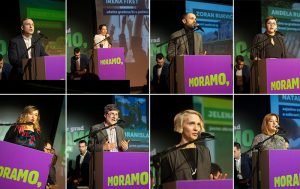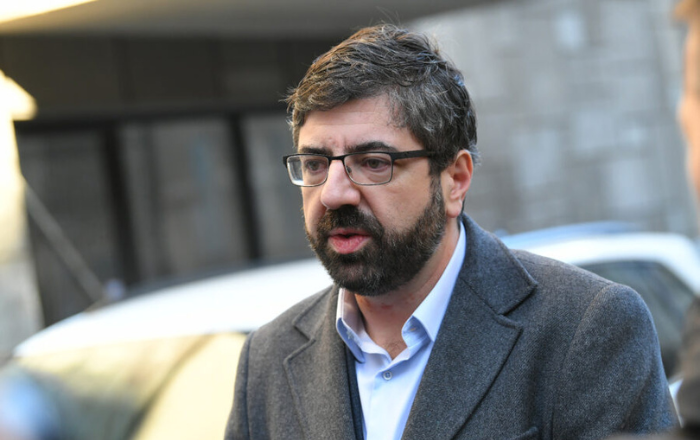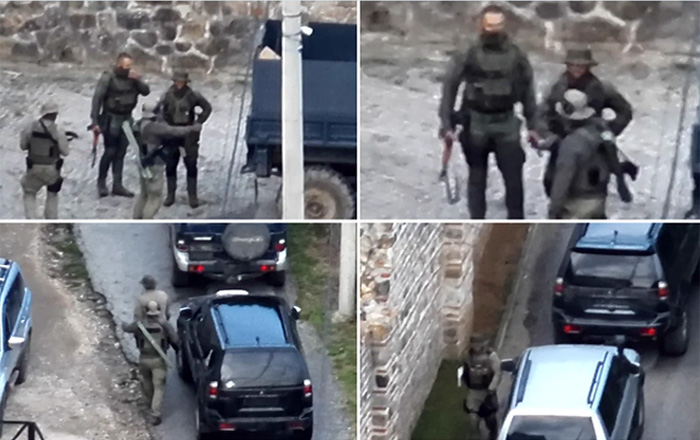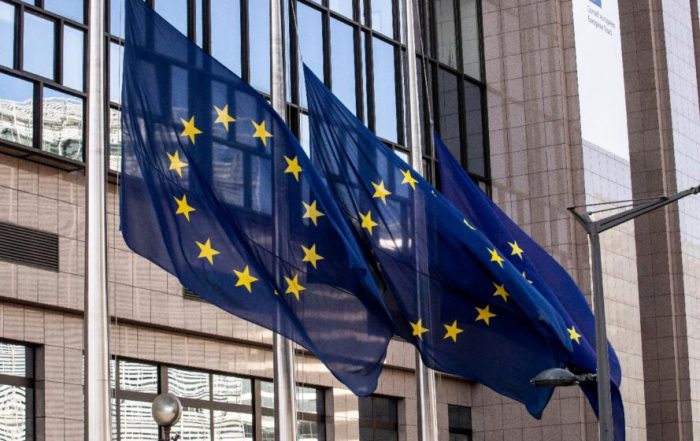At the fifth Assembly of the movement Ne Davimo Beograd, members voted on the people who will be part of the list of the green-left coalition MORAMO in the upcoming elections.
We present to you a list of candidates for Ne Davimo Beograd, who will be part of electoral lists for city elections, together with coalition partners. The final list will be agreed upon several criteria, such as gender parity, people’s preference for participation in a specific list and possible withdrawal of some candidates until the day the list is submitted. The list for national elections will also be made based on these issues.
1. Dobrica Veselinović
Dobrica Veselinović was born in 1981 in Belgrade, where he spent all his life. He graduated from the First Belgrade Gymnasium and the Faculty of Political Sciences in Belgrade. For more than 10 years he has been at the forefront of civil society organizations in the areas of sustainable urban development, ecology, cultural policies, and civil, political and social rights.
He specifically deals with issues of public and common goods and public space. He is one of the founders of the Institute for Urban Policy and the Independent Cultural Scene of Serbia, as well as the Građanski front (civic front) Association and Ne Davimo Beograd movement, where he is currently a member of the Small Council. His areas of interest are political theory, ecology and urban development issues. He likes to organise things and people and creates situations that make people smile. He tries to fix the broken, discovers the forgotten, fixes the neglected and finishes the unfinished.
2. Natalija Simović
Natalija Simović was born on October 17, 1983. years in Užice. She graduated in English at the Faculty of Philology in Belgrade and holds a master’s degree in Cultural Management and Cultural Policy at the Rectorate of the University of Arts. She was a Philanthropist Fellow at CUNY University in New York in the Young Leaders Program. She has been active in the civil sector for over 10 years, especially in the field of support for the establishment of social protection services, women’s rights and gender equality.
In her current professional role, she devises support strategies for united citizens throughout Serbia. Natalija has been in the Ne Davimo Beograd movement since its founding, she is now a member of the Small Council, and previously she was coordinating the Women’s Group, and she was involved in raising funds. She is dedicated to the fight for social justice, and her areas of special interest are women’s rights, social policies and human rights.
3. Radomir Lazović
Radomir Lazović was born in 1980 in Belgrade, where he finished primary and secondary school, after which he studied at the Faculty of Agriculture. He has been active in the civil sector for more than 10 years in the field of cultural policies, citizen participation in decision-making on city development, civil, political and social rights, democratic innovation and the media. Over the past years, he has participated in several initiatives and movements (such as Street Gallery, Inex Film, Cinemas: Return of the Written Off, Occupation of Zvezda Cinema, Ministarstvo Prostora) advocating for innovative use of public spaces, fair resource management, transformation of public services and a just, solidary and democratic society. From 2015 to 2017, he was the President of the Board of Directors of the Association of the Independent Cultural Scene of Serbia. He is one of the founders of Ne Davimo Beograd, and he is a member of the Small Council where he is in charge of media relations.
4. Jelena Vasiljević
Jelena Vasiljević was born in 1981 in Belgrade, where she finished elementary and high school. Jelena is a senior research associate at the Institute of Philosophy and Social Theory. She holds a PhD in ethnology and anthropology from the Faculty of Philosophy in Belgrade. She has worked as a research associate and scholarship holder at the Universities of Edinburgh and Graz. In her scientific work, she mostly dealt with the study of citizenship, the culture of remembrance and the research of media narratives in the context of the disintegration of Yugoslavia and the wars of the 1990s.
She is currently most interested in the topics of political solidarity, activist citizenship and social movements in the Balkans. She is the author of the monograph Anthropology of Citizenship (Mediterran 2016), co-author of the study Democratization from Below: Formation and Action of New Social Movements in Serbia and North Macedonia. She has published dozens of scientific articles in domestic and foreign scientific journals. She is a member of the Coordination Board of the Academic Solidarity and Engagement Network (MASA) and is part of the expert team of BiEPAG (The Balkans in Europe Policy Advisory Group). In Ne Davimo Beograd, she is the coordinator of the Education Group and the Co-Chair of the Big Council.
5. Robert Kozma
Robert Kozma was born in 1983 in Subotica. He graduated in political science at the Faculty of Political Science in Belgrade and a master’s degree in political science at the Central European University in Budapest. For the past ten years, he has designed and implemented intercultural and democracy education programs. Since the founding, Belgrade has been actively involved in the work of the Education Group and at the same time in the development of the Civic Front, ie alliances with similar initiatives and movements in Serbia.
6. Irena Fiket
Irena Fiket was born in 1978 in Belgrade. Irena is a research associate at the Institute of Philosophy and Social Theory. She holds a PhD in political science and sociology from La Sapienza University in Rome, and postdoctoral studies at the Universities of Siena, Oslo, Bologna and Florence. She has published dozens of scientific papers on civic participation, activist citizenship, deliberative democracy and gender equality. During her fifteen-year stay in Italy, she participated in initiatives to institutionalize innovative models of civic participation at the local and regional level.
She worked on the analysis and implementation of the experimental law of the Region of Tuscany, which institutionalized the deliberative model of democracy. She currently runs the European Jean Monnet Network for the Study and Promotion of Active Citizenship in the Western Balkans and is a member and co-founder of the Standing Group on Democratic Innovation at the European Consortium for Policy Research. She is coordinating the municipal board for Vracar within Ne Davimo Beograd
Leading candidates for the general elections’ list
We present the first 6 candidates Ne Davimo Beograd on the general elections’ list of the green-left coalition MORAMO (WE MUST). The next candidates will be proposed to depict the order on the city list, with deviations due to the coalition agreement, reaching the agreed gender parity, people’s preferences towards participating in a specific list and possible withdrawal of candidates until the day of submitting the list.
1. Biljana Đorđević
Biljana Đorđević was born in 1984 in Vranje. She finished elementary school in Bujanovac, high school in Vranje, and elementary, master’s and doctoral studies at the Faculty of Political Science, University of Belgrade. She also completed a master’s degree in political theory at the University of Oxford. She is an assistant professor at the Faculty of Political Science, University of Belgrade, where she teaches courses in the field of contemporary political theories. She is a member of the Lower Council of Ne Davimo Beograd.
She was previously the coordinator of Ne Davimo Beograd Political Council and a member of the Women’s and Socio-Economic Group of the initiative. She is a member of the Presidency of the Association for Political Science of Serbia and the Serbian Association for Legal and Social Philosophy. She is also in the Board of Directors of A11 – Initiative for Economic and Social Rights, as well as in the Network of Academic Solidarity and Engagement – MASA and the International Observatory of Municipalism – Minim.
2. Radomir Lazović
Radomir Lazović was born in 1980 in Belgrade, where he finished primary and secondary school, after which he studied at the Faculty of Agriculture. He has been active in the civil sector for more than 10 years in the field of cultural policies, citizen participation in decision-making on city development, civil, political and social rights, democratic innovation and the media. Over the past years, he has participated in several initiatives and movements (such as Street Gallery, Inex Film, Cinemas: Return of the Written Off, Occupation of Zvezda Cinema, Ministarstvo Prostora) advocating for innovative use of public spaces, fair resource management, transformation of public services and a just, solidary and democratic society. From 2015 to 2017, he was the President of the Board of Directors of the Association of the Independent Cultural Scene of Serbia. He is one of the founders of Ne Davimo Beograd, and he is a member of the Small Council where he is in charge of media relations.
3. Đorđe Pavićević
Đorđe Pavićević is a full professor at the Faculty of Political Science, University of Belgrade and coordinator of the Political Council of the Let’s Not Drown Belgrade movement. He teaches courses in the field of contemporary political theory at all three levels of study. He is one of the academic workers who takes an active part in political and social events in the country and in Belgrade. In the last convocation, he was a member of Ne Davimo Beograd’s Political Council. From the beginning, he has supported the work Ne Davimo Beograd’s and has given immeasurable contributions to the work of the movement so far.
4. Jelena Jerinić
Jelena Jerinić is a visiting professor and vice Dean for Science at the Faculty of Law, Union University in Belgrade. She teaches constitutional law, administrative law and local self-government law. She is a member of the Group of Independent Experts for the European Charter of Local Self-Government of the Council of Europe. She is a member of the Legal Team of Ne Davimo Beograd and seat in its Ethics Committee. During the Belgrade elections in 2018, she was a deputy member of the City Electoral Commission, nominated by Ne Davimo Beograd.
5. Robert Kozma
Robert Kozma was born in 1983 in Subotica. He graduated in political science at the Faculty of Political Science in Belgrade and a master’s degree in political science at the Central European University in Budapest. For the past ten years, he has designed and implemented intercultural and democracy education programs. Robert is actively involved since the founding. Until now, he was part of the work of the Education Group and at the same time in the development of Gradjanski Front, i.e. building alliances with similar initiatives and movements in Serbia. He is currently a member of the Lower Council and part of the Electoral City Commission.
6. Dobrica Veselinović
Dobrica Veselinović was born in 1981 in Belgrade, where he spent all his life. He graduated from the First Belgrade Gymnasium and the Faculty of Political Sciences in Belgrade. For more than 10 years he has been at the forefront of civil society organizations in the areas of sustainable urban development, ecology, cultural policies, and civil, political and social rights.
He specifically deals with issues of public and common goods and public space. He is one of the founders of the Institute for Urban Policy and the Independent Cultural Scene of Serbia, as well as the Građanski front (civic front) Association and Ne Davimo Beograd movement, where he is currently a member of the Small Council. His areas of interest are political theory, ecology and urban development issues. He likes to organise things and people and creates situations that make people smile. He tries to fix the broken, discovers the forgotten, fixes the neglected and finishes the unfinished.
More from Ne davimo Beograd:
Lazovic to attend EP session: I expect them to call for rerun of Serbian elections
MP of the opposition Green-Left Front Radomir Lazovic said that, in its resolution on the Serbian elections, he expects the European Parliament (EP) to voice its position that elections must be repeated at all levels in Serbia, especially in Belgrade, where the opposition was robbed of its clear victory.
We Demand Responsibility and Restraint in Solving the Crisis in the North of Kosovo
We call for responsibility and restraint in solving the crisis in the north of Kosovo, in the Banjska monastery, so that the conflict does not escalate or lead to a new tragedy. We condemn provocations and violence from any side, and demand a thorough investigation.
Setting the Community of Serb Municipalities and membership in the EU as necessary first step towards the reconciliation of the two peoples
It is a real tragedy of our society that the same people who led to the fact that Kosovo is not de facto part of the constitutional order of







